Individual, Team, and Organizational Development for HR Advisor Role
VerifiedAdded on 2020/10/23
|18
|5493
|284
Report
AI Summary
This report delves into the essential skills, knowledge, and behaviors required of an HR Advisor, emphasizing the importance of continuous learning and professional development within an organizational context. It begins by outlining the key competencies, including personnel and human resources knowledge, commercial and employment legislation, psychology, and computer skills. It then describes communication, problem-solving, decision-making, and negotiation skills, along with behaviors such as accountability, inclusiveness, and adaptability. The report includes a skills audit to identify skill gaps and a professional development plan for improvement. It also differentiates between individual and organizational learning, training, and development, while highlighting the contribution of High-Performance Work (HPW) and evaluating different performance management approaches. The report underscores the significance of these elements in driving sustainable business performance and fostering a high-performance culture. The report highlights the importance of continuous learning and professional development for HR advisors, including skills audits, professional development plans, and performance management strategies.
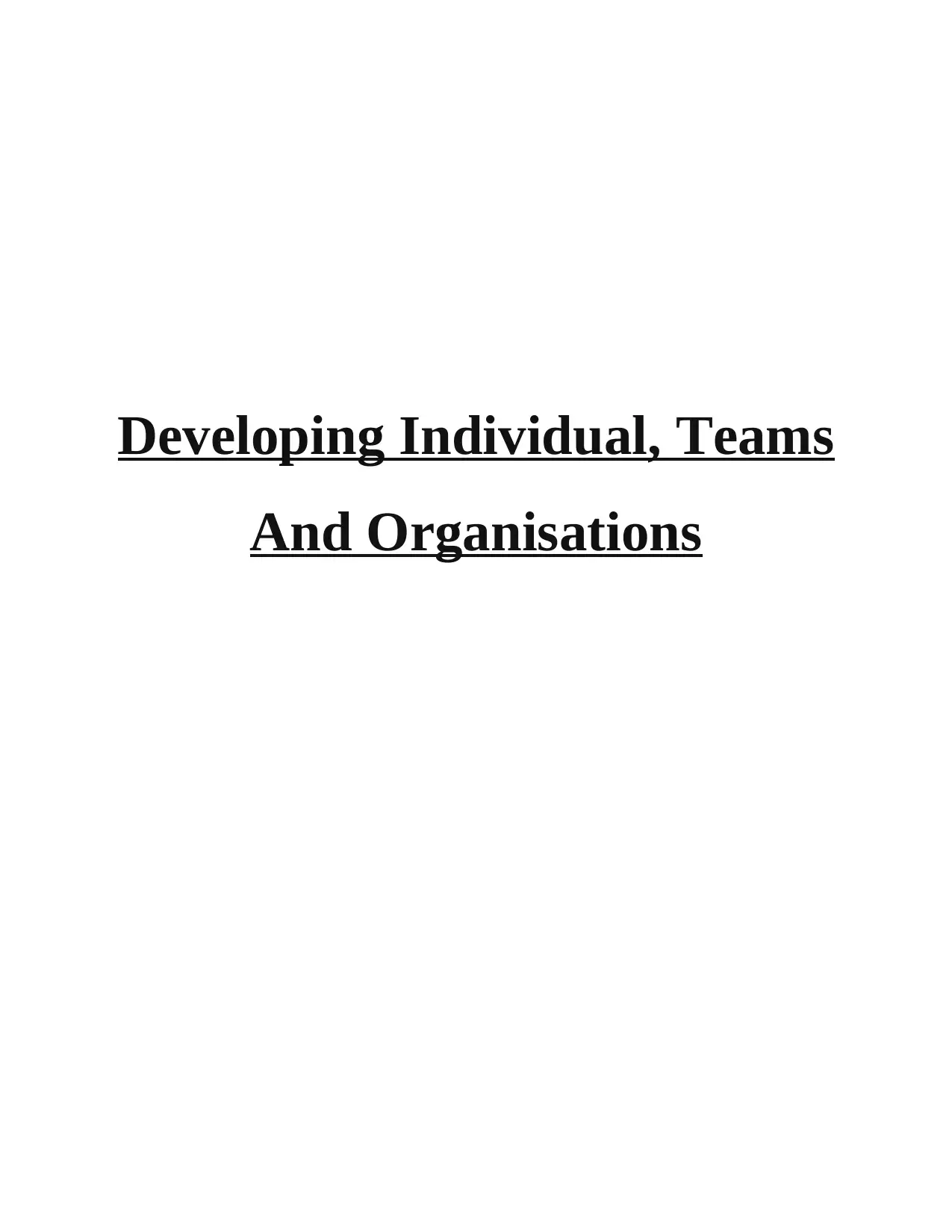
Developing Individual, Teams
And Organisations
And Organisations
Paraphrase This Document
Need a fresh take? Get an instant paraphrase of this document with our AI Paraphraser
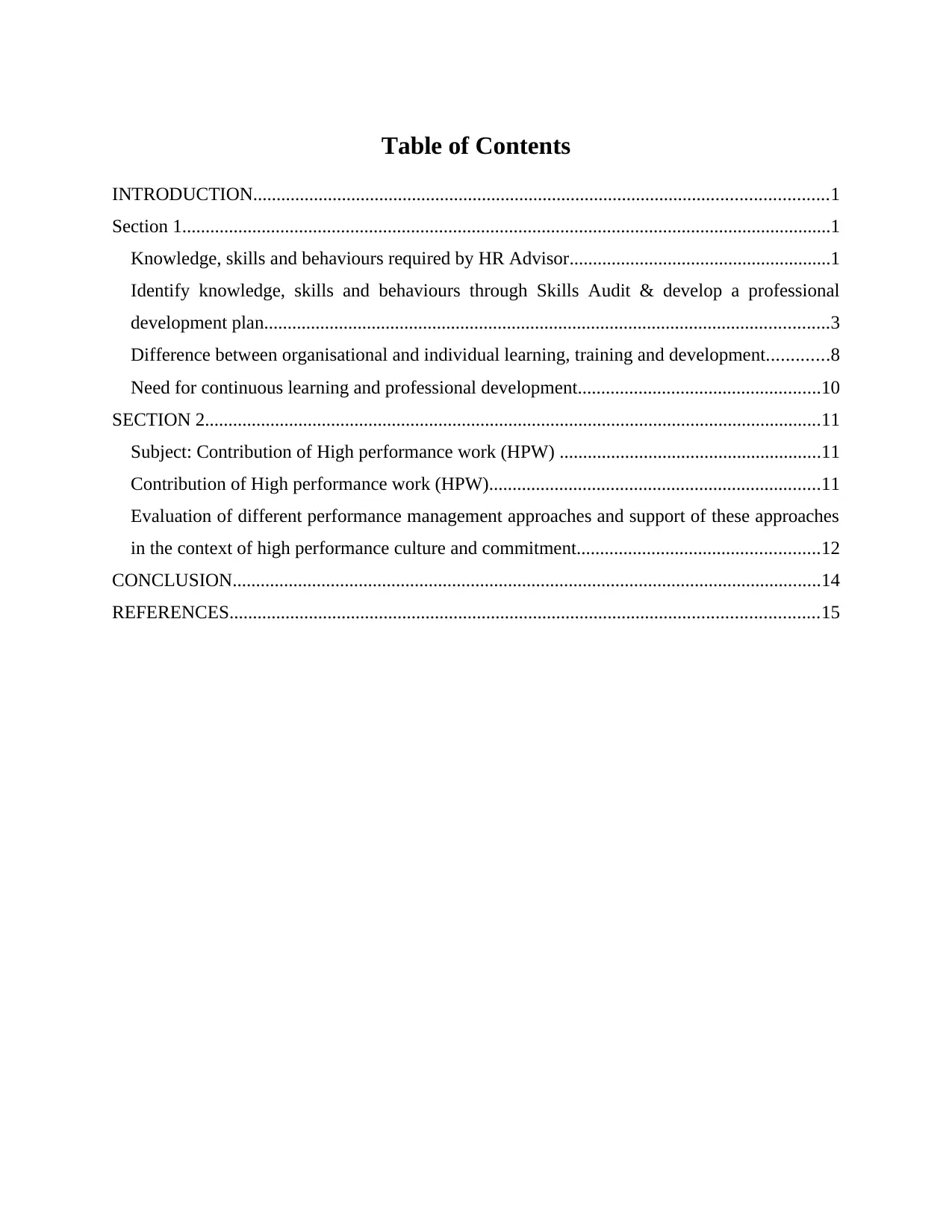
Table of Contents
INTRODUCTION...........................................................................................................................1
Section 1...........................................................................................................................................1
Knowledge, skills and behaviours required by HR Advisor........................................................1
Identify knowledge, skills and behaviours through Skills Audit & develop a professional
development plan.........................................................................................................................3
Difference between organisational and individual learning, training and development.............8
Need for continuous learning and professional development....................................................10
SECTION 2....................................................................................................................................11
Subject: Contribution of High performance work (HPW) ........................................................11
Contribution of High performance work (HPW).......................................................................11
Evaluation of different performance management approaches and support of these approaches
in the context of high performance culture and commitment....................................................12
CONCLUSION..............................................................................................................................14
REFERENCES..............................................................................................................................15
INTRODUCTION...........................................................................................................................1
Section 1...........................................................................................................................................1
Knowledge, skills and behaviours required by HR Advisor........................................................1
Identify knowledge, skills and behaviours through Skills Audit & develop a professional
development plan.........................................................................................................................3
Difference between organisational and individual learning, training and development.............8
Need for continuous learning and professional development....................................................10
SECTION 2....................................................................................................................................11
Subject: Contribution of High performance work (HPW) ........................................................11
Contribution of High performance work (HPW).......................................................................11
Evaluation of different performance management approaches and support of these approaches
in the context of high performance culture and commitment....................................................12
CONCLUSION..............................................................................................................................14
REFERENCES..............................................................................................................................15
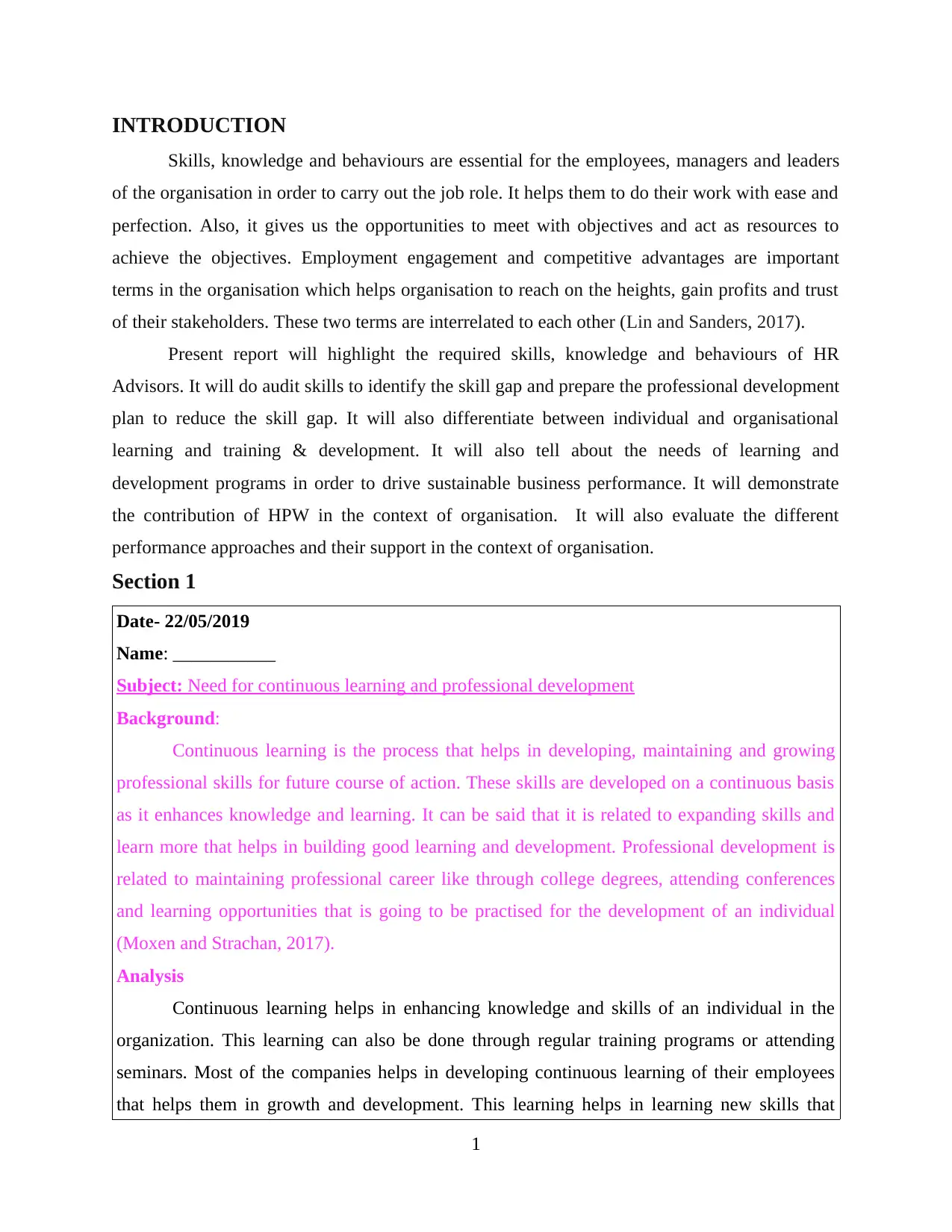
INTRODUCTION
Skills, knowledge and behaviours are essential for the employees, managers and leaders
of the organisation in order to carry out the job role. It helps them to do their work with ease and
perfection. Also, it gives us the opportunities to meet with objectives and act as resources to
achieve the objectives. Employment engagement and competitive advantages are important
terms in the organisation which helps organisation to reach on the heights, gain profits and trust
of their stakeholders. These two terms are interrelated to each other (Lin and Sanders, 2017).
Present report will highlight the required skills, knowledge and behaviours of HR
Advisors. It will do audit skills to identify the skill gap and prepare the professional development
plan to reduce the skill gap. It will also differentiate between individual and organisational
learning and training & development. It will also tell about the needs of learning and
development programs in order to drive sustainable business performance. It will demonstrate
the contribution of HPW in the context of organisation. It will also evaluate the different
performance approaches and their support in the context of organisation.
Section 1
Date- 22/05/2019
Name: ___________
Subject: Need for continuous learning and professional development
Background:
Continuous learning is the process that helps in developing, maintaining and growing
professional skills for future course of action. These skills are developed on a continuous basis
as it enhances knowledge and learning. It can be said that it is related to expanding skills and
learn more that helps in building good learning and development. Professional development is
related to maintaining professional career like through college degrees, attending conferences
and learning opportunities that is going to be practised for the development of an individual
(Moxen and Strachan, 2017).
Analysis
Continuous learning helps in enhancing knowledge and skills of an individual in the
organization. This learning can also be done through regular training programs or attending
seminars. Most of the companies helps in developing continuous learning of their employees
that helps them in growth and development. This learning helps in learning new skills that
1
Skills, knowledge and behaviours are essential for the employees, managers and leaders
of the organisation in order to carry out the job role. It helps them to do their work with ease and
perfection. Also, it gives us the opportunities to meet with objectives and act as resources to
achieve the objectives. Employment engagement and competitive advantages are important
terms in the organisation which helps organisation to reach on the heights, gain profits and trust
of their stakeholders. These two terms are interrelated to each other (Lin and Sanders, 2017).
Present report will highlight the required skills, knowledge and behaviours of HR
Advisors. It will do audit skills to identify the skill gap and prepare the professional development
plan to reduce the skill gap. It will also differentiate between individual and organisational
learning and training & development. It will also tell about the needs of learning and
development programs in order to drive sustainable business performance. It will demonstrate
the contribution of HPW in the context of organisation. It will also evaluate the different
performance approaches and their support in the context of organisation.
Section 1
Date- 22/05/2019
Name: ___________
Subject: Need for continuous learning and professional development
Background:
Continuous learning is the process that helps in developing, maintaining and growing
professional skills for future course of action. These skills are developed on a continuous basis
as it enhances knowledge and learning. It can be said that it is related to expanding skills and
learn more that helps in building good learning and development. Professional development is
related to maintaining professional career like through college degrees, attending conferences
and learning opportunities that is going to be practised for the development of an individual
(Moxen and Strachan, 2017).
Analysis
Continuous learning helps in enhancing knowledge and skills of an individual in the
organization. This learning can also be done through regular training programs or attending
seminars. Most of the companies helps in developing continuous learning of their employees
that helps them in growth and development. This learning helps in learning new skills that
1
⊘ This is a preview!⊘
Do you want full access?
Subscribe today to unlock all pages.

Trusted by 1+ million students worldwide
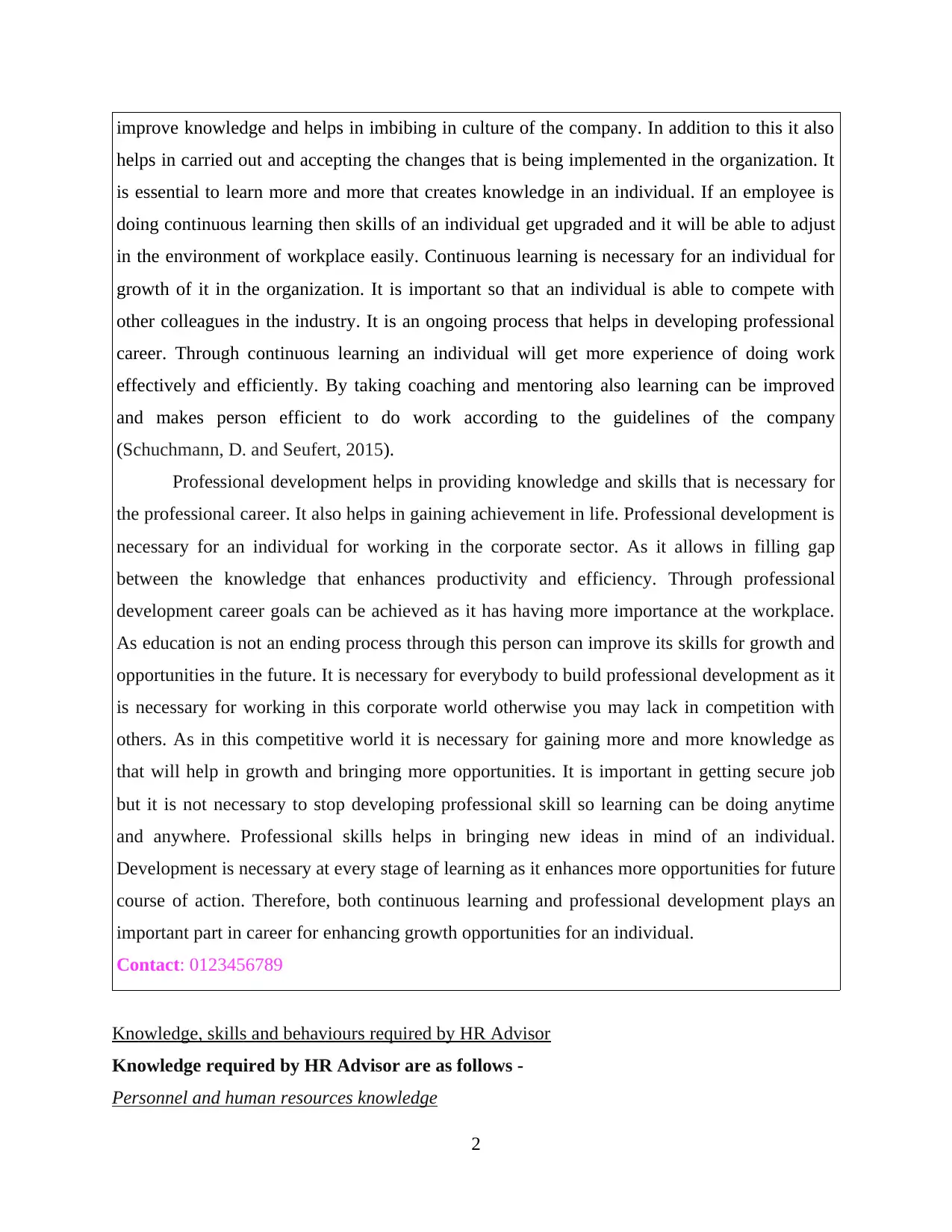
improve knowledge and helps in imbibing in culture of the company. In addition to this it also
helps in carried out and accepting the changes that is being implemented in the organization. It
is essential to learn more and more that creates knowledge in an individual. If an employee is
doing continuous learning then skills of an individual get upgraded and it will be able to adjust
in the environment of workplace easily. Continuous learning is necessary for an individual for
growth of it in the organization. It is important so that an individual is able to compete with
other colleagues in the industry. It is an ongoing process that helps in developing professional
career. Through continuous learning an individual will get more experience of doing work
effectively and efficiently. By taking coaching and mentoring also learning can be improved
and makes person efficient to do work according to the guidelines of the company
(Schuchmann, D. and Seufert, 2015).
Professional development helps in providing knowledge and skills that is necessary for
the professional career. It also helps in gaining achievement in life. Professional development is
necessary for an individual for working in the corporate sector. As it allows in filling gap
between the knowledge that enhances productivity and efficiency. Through professional
development career goals can be achieved as it has having more importance at the workplace.
As education is not an ending process through this person can improve its skills for growth and
opportunities in the future. It is necessary for everybody to build professional development as it
is necessary for working in this corporate world otherwise you may lack in competition with
others. As in this competitive world it is necessary for gaining more and more knowledge as
that will help in growth and bringing more opportunities. It is important in getting secure job
but it is not necessary to stop developing professional skill so learning can be doing anytime
and anywhere. Professional skills helps in bringing new ideas in mind of an individual.
Development is necessary at every stage of learning as it enhances more opportunities for future
course of action. Therefore, both continuous learning and professional development plays an
important part in career for enhancing growth opportunities for an individual.
Contact: 0123456789
Knowledge, skills and behaviours required by HR Advisor
Knowledge required by HR Advisor are as follows -
Personnel and human resources knowledge
2
helps in carried out and accepting the changes that is being implemented in the organization. It
is essential to learn more and more that creates knowledge in an individual. If an employee is
doing continuous learning then skills of an individual get upgraded and it will be able to adjust
in the environment of workplace easily. Continuous learning is necessary for an individual for
growth of it in the organization. It is important so that an individual is able to compete with
other colleagues in the industry. It is an ongoing process that helps in developing professional
career. Through continuous learning an individual will get more experience of doing work
effectively and efficiently. By taking coaching and mentoring also learning can be improved
and makes person efficient to do work according to the guidelines of the company
(Schuchmann, D. and Seufert, 2015).
Professional development helps in providing knowledge and skills that is necessary for
the professional career. It also helps in gaining achievement in life. Professional development is
necessary for an individual for working in the corporate sector. As it allows in filling gap
between the knowledge that enhances productivity and efficiency. Through professional
development career goals can be achieved as it has having more importance at the workplace.
As education is not an ending process through this person can improve its skills for growth and
opportunities in the future. It is necessary for everybody to build professional development as it
is necessary for working in this corporate world otherwise you may lack in competition with
others. As in this competitive world it is necessary for gaining more and more knowledge as
that will help in growth and bringing more opportunities. It is important in getting secure job
but it is not necessary to stop developing professional skill so learning can be doing anytime
and anywhere. Professional skills helps in bringing new ideas in mind of an individual.
Development is necessary at every stage of learning as it enhances more opportunities for future
course of action. Therefore, both continuous learning and professional development plays an
important part in career for enhancing growth opportunities for an individual.
Contact: 0123456789
Knowledge, skills and behaviours required by HR Advisor
Knowledge required by HR Advisor are as follows -
Personnel and human resources knowledge
2
Paraphrase This Document
Need a fresh take? Get an instant paraphrase of this document with our AI Paraphraser
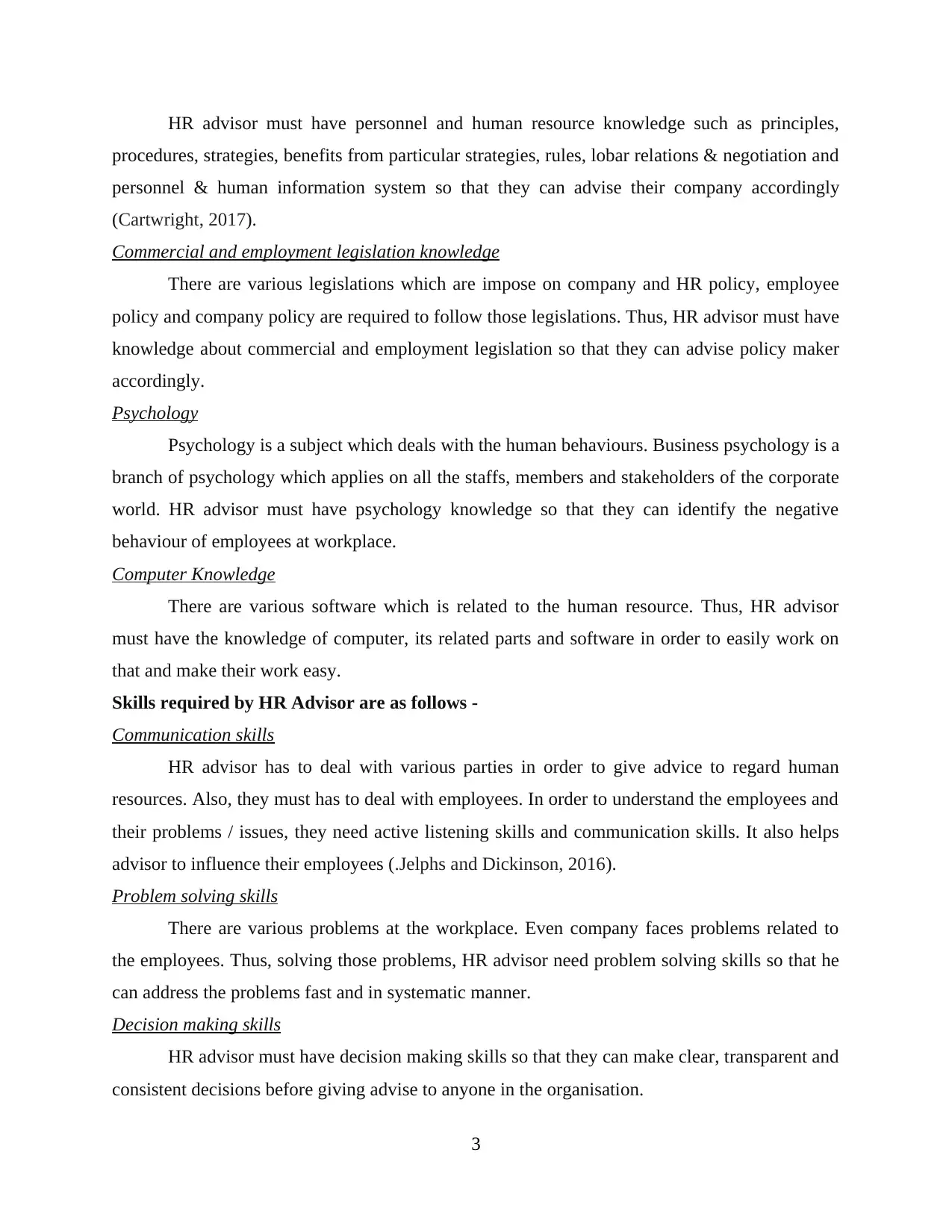
HR advisor must have personnel and human resource knowledge such as principles,
procedures, strategies, benefits from particular strategies, rules, lobar relations & negotiation and
personnel & human information system so that they can advise their company accordingly
(Cartwright, 2017).
Commercial and employment legislation knowledge
There are various legislations which are impose on company and HR policy, employee
policy and company policy are required to follow those legislations. Thus, HR advisor must have
knowledge about commercial and employment legislation so that they can advise policy maker
accordingly.
Psychology
Psychology is a subject which deals with the human behaviours. Business psychology is a
branch of psychology which applies on all the staffs, members and stakeholders of the corporate
world. HR advisor must have psychology knowledge so that they can identify the negative
behaviour of employees at workplace.
Computer Knowledge
There are various software which is related to the human resource. Thus, HR advisor
must have the knowledge of computer, its related parts and software in order to easily work on
that and make their work easy.
Skills required by HR Advisor are as follows -
Communication skills
HR advisor has to deal with various parties in order to give advice to regard human
resources. Also, they must has to deal with employees. In order to understand the employees and
their problems / issues, they need active listening skills and communication skills. It also helps
advisor to influence their employees (.Jelphs and Dickinson, 2016).
Problem solving skills
There are various problems at the workplace. Even company faces problems related to
the employees. Thus, solving those problems, HR advisor need problem solving skills so that he
can address the problems fast and in systematic manner.
Decision making skills
HR advisor must have decision making skills so that they can make clear, transparent and
consistent decisions before giving advise to anyone in the organisation.
3
procedures, strategies, benefits from particular strategies, rules, lobar relations & negotiation and
personnel & human information system so that they can advise their company accordingly
(Cartwright, 2017).
Commercial and employment legislation knowledge
There are various legislations which are impose on company and HR policy, employee
policy and company policy are required to follow those legislations. Thus, HR advisor must have
knowledge about commercial and employment legislation so that they can advise policy maker
accordingly.
Psychology
Psychology is a subject which deals with the human behaviours. Business psychology is a
branch of psychology which applies on all the staffs, members and stakeholders of the corporate
world. HR advisor must have psychology knowledge so that they can identify the negative
behaviour of employees at workplace.
Computer Knowledge
There are various software which is related to the human resource. Thus, HR advisor
must have the knowledge of computer, its related parts and software in order to easily work on
that and make their work easy.
Skills required by HR Advisor are as follows -
Communication skills
HR advisor has to deal with various parties in order to give advice to regard human
resources. Also, they must has to deal with employees. In order to understand the employees and
their problems / issues, they need active listening skills and communication skills. It also helps
advisor to influence their employees (.Jelphs and Dickinson, 2016).
Problem solving skills
There are various problems at the workplace. Even company faces problems related to
the employees. Thus, solving those problems, HR advisor need problem solving skills so that he
can address the problems fast and in systematic manner.
Decision making skills
HR advisor must have decision making skills so that they can make clear, transparent and
consistent decisions before giving advise to anyone in the organisation.
3
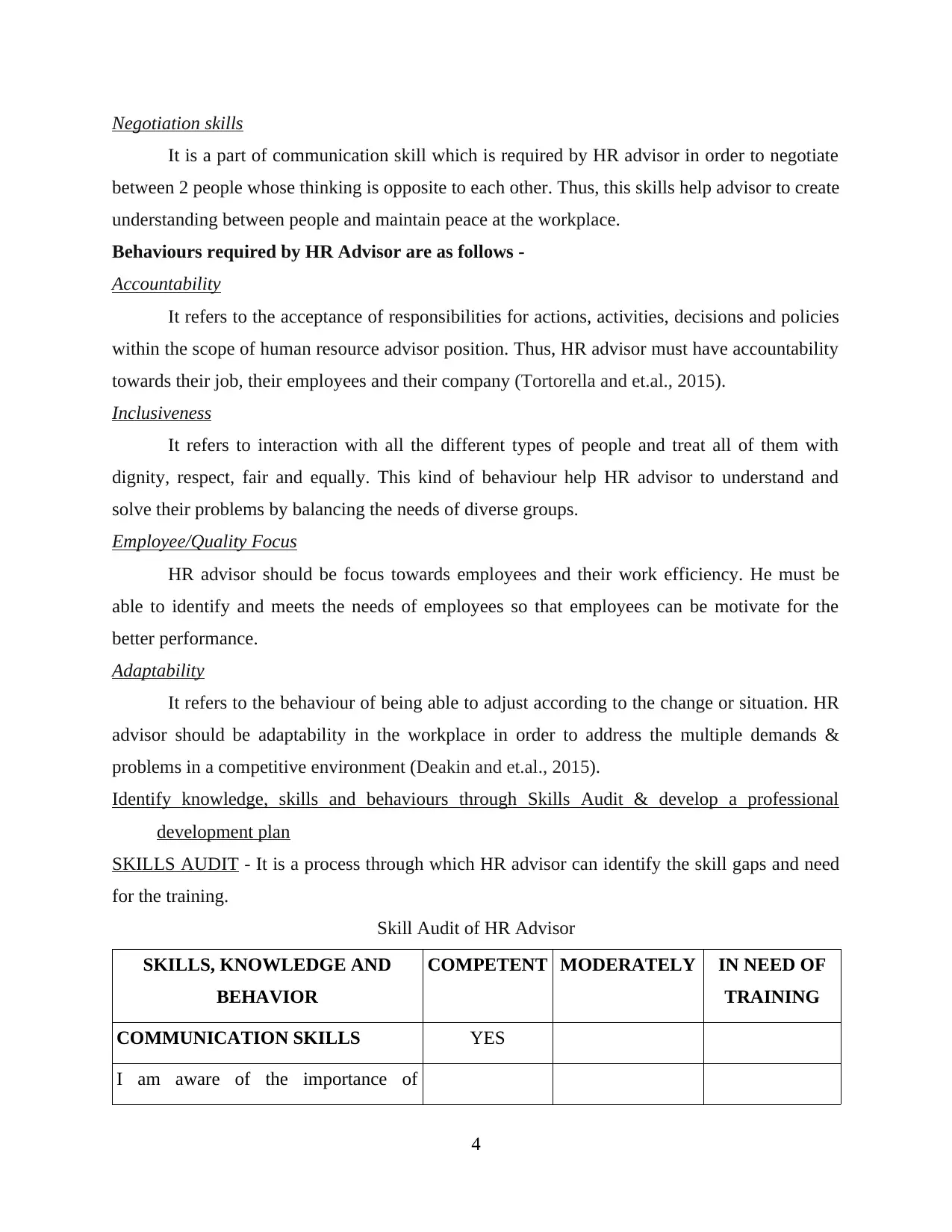
Negotiation skills
It is a part of communication skill which is required by HR advisor in order to negotiate
between 2 people whose thinking is opposite to each other. Thus, this skills help advisor to create
understanding between people and maintain peace at the workplace.
Behaviours required by HR Advisor are as follows -
Accountability
It refers to the acceptance of responsibilities for actions, activities, decisions and policies
within the scope of human resource advisor position. Thus, HR advisor must have accountability
towards their job, their employees and their company (Tortorella and et.al., 2015).
Inclusiveness
It refers to interaction with all the different types of people and treat all of them with
dignity, respect, fair and equally. This kind of behaviour help HR advisor to understand and
solve their problems by balancing the needs of diverse groups.
Employee/Quality Focus
HR advisor should be focus towards employees and their work efficiency. He must be
able to identify and meets the needs of employees so that employees can be motivate for the
better performance.
Adaptability
It refers to the behaviour of being able to adjust according to the change or situation. HR
advisor should be adaptability in the workplace in order to address the multiple demands &
problems in a competitive environment (Deakin and et.al., 2015).
Identify knowledge, skills and behaviours through Skills Audit & develop a professional
development plan
SKILLS AUDIT - It is a process through which HR advisor can identify the skill gaps and need
for the training.
Skill Audit of HR Advisor
SKILLS, KNOWLEDGE AND
BEHAVIOR
COMPETENT MODERATELY IN NEED OF
TRAINING
COMMUNICATION SKILLS YES
I am aware of the importance of
4
It is a part of communication skill which is required by HR advisor in order to negotiate
between 2 people whose thinking is opposite to each other. Thus, this skills help advisor to create
understanding between people and maintain peace at the workplace.
Behaviours required by HR Advisor are as follows -
Accountability
It refers to the acceptance of responsibilities for actions, activities, decisions and policies
within the scope of human resource advisor position. Thus, HR advisor must have accountability
towards their job, their employees and their company (Tortorella and et.al., 2015).
Inclusiveness
It refers to interaction with all the different types of people and treat all of them with
dignity, respect, fair and equally. This kind of behaviour help HR advisor to understand and
solve their problems by balancing the needs of diverse groups.
Employee/Quality Focus
HR advisor should be focus towards employees and their work efficiency. He must be
able to identify and meets the needs of employees so that employees can be motivate for the
better performance.
Adaptability
It refers to the behaviour of being able to adjust according to the change or situation. HR
advisor should be adaptability in the workplace in order to address the multiple demands &
problems in a competitive environment (Deakin and et.al., 2015).
Identify knowledge, skills and behaviours through Skills Audit & develop a professional
development plan
SKILLS AUDIT - It is a process through which HR advisor can identify the skill gaps and need
for the training.
Skill Audit of HR Advisor
SKILLS, KNOWLEDGE AND
BEHAVIOR
COMPETENT MODERATELY IN NEED OF
TRAINING
COMMUNICATION SKILLS YES
I am aware of the importance of
4
⊘ This is a preview!⊘
Do you want full access?
Subscribe today to unlock all pages.

Trusted by 1+ million students worldwide
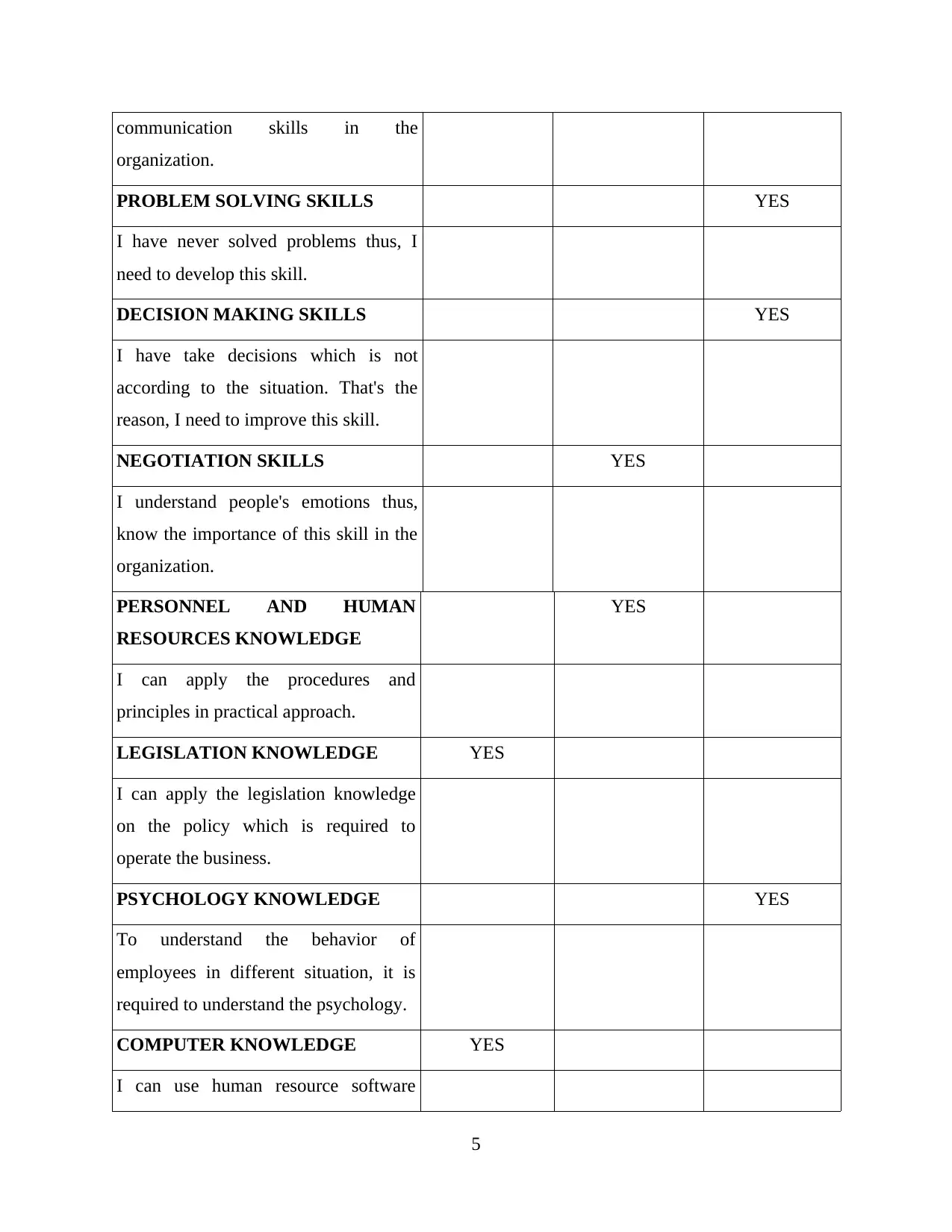
communication skills in the
organization.
PROBLEM SOLVING SKILLS YES
I have never solved problems thus, I
need to develop this skill.
DECISION MAKING SKILLS YES
I have take decisions which is not
according to the situation. That's the
reason, I need to improve this skill.
NEGOTIATION SKILLS YES
I understand people's emotions thus,
know the importance of this skill in the
organization.
PERSONNEL AND HUMAN
RESOURCES KNOWLEDGE
YES
I can apply the procedures and
principles in practical approach.
LEGISLATION KNOWLEDGE YES
I can apply the legislation knowledge
on the policy which is required to
operate the business.
PSYCHOLOGY KNOWLEDGE YES
To understand the behavior of
employees in different situation, it is
required to understand the psychology.
COMPUTER KNOWLEDGE YES
I can use human resource software
5
organization.
PROBLEM SOLVING SKILLS YES
I have never solved problems thus, I
need to develop this skill.
DECISION MAKING SKILLS YES
I have take decisions which is not
according to the situation. That's the
reason, I need to improve this skill.
NEGOTIATION SKILLS YES
I understand people's emotions thus,
know the importance of this skill in the
organization.
PERSONNEL AND HUMAN
RESOURCES KNOWLEDGE
YES
I can apply the procedures and
principles in practical approach.
LEGISLATION KNOWLEDGE YES
I can apply the legislation knowledge
on the policy which is required to
operate the business.
PSYCHOLOGY KNOWLEDGE YES
To understand the behavior of
employees in different situation, it is
required to understand the psychology.
COMPUTER KNOWLEDGE YES
I can use human resource software
5
Paraphrase This Document
Need a fresh take? Get an instant paraphrase of this document with our AI Paraphraser
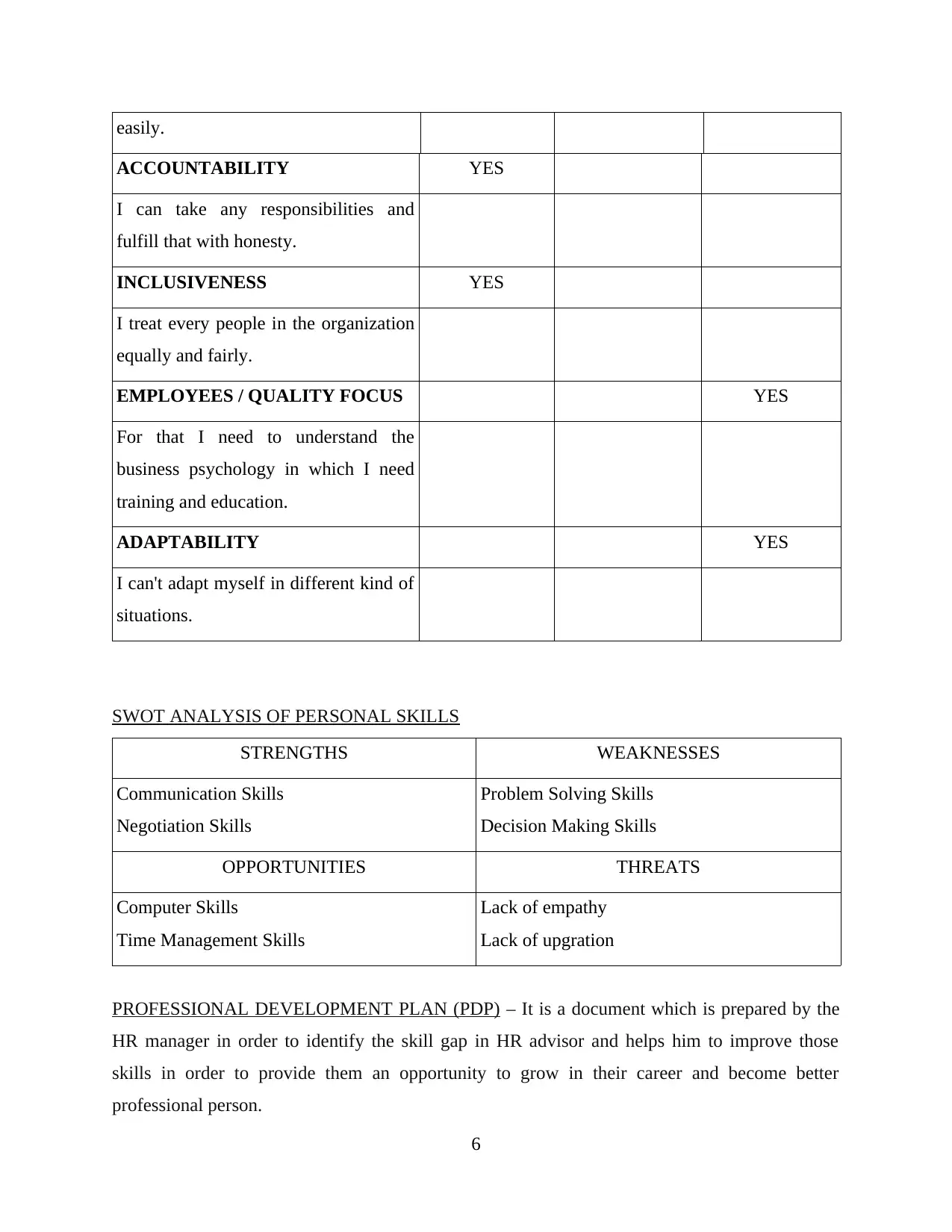
easily.
ACCOUNTABILITY YES
I can take any responsibilities and
fulfill that with honesty.
INCLUSIVENESS YES
I treat every people in the organization
equally and fairly.
EMPLOYEES / QUALITY FOCUS YES
For that I need to understand the
business psychology in which I need
training and education.
ADAPTABILITY YES
I can't adapt myself in different kind of
situations.
SWOT ANALYSIS OF PERSONAL SKILLS
STRENGTHS WEAKNESSES
Communication Skills
Negotiation Skills
Problem Solving Skills
Decision Making Skills
OPPORTUNITIES THREATS
Computer Skills
Time Management Skills
Lack of empathy
Lack of upgration
PROFESSIONAL DEVELOPMENT PLAN (PDP) – It is a document which is prepared by the
HR manager in order to identify the skill gap in HR advisor and helps him to improve those
skills in order to provide them an opportunity to grow in their career and become better
professional person.
6
ACCOUNTABILITY YES
I can take any responsibilities and
fulfill that with honesty.
INCLUSIVENESS YES
I treat every people in the organization
equally and fairly.
EMPLOYEES / QUALITY FOCUS YES
For that I need to understand the
business psychology in which I need
training and education.
ADAPTABILITY YES
I can't adapt myself in different kind of
situations.
SWOT ANALYSIS OF PERSONAL SKILLS
STRENGTHS WEAKNESSES
Communication Skills
Negotiation Skills
Problem Solving Skills
Decision Making Skills
OPPORTUNITIES THREATS
Computer Skills
Time Management Skills
Lack of empathy
Lack of upgration
PROFESSIONAL DEVELOPMENT PLAN (PDP) – It is a document which is prepared by the
HR manager in order to identify the skill gap in HR advisor and helps him to improve those
skills in order to provide them an opportunity to grow in their career and become better
professional person.
6
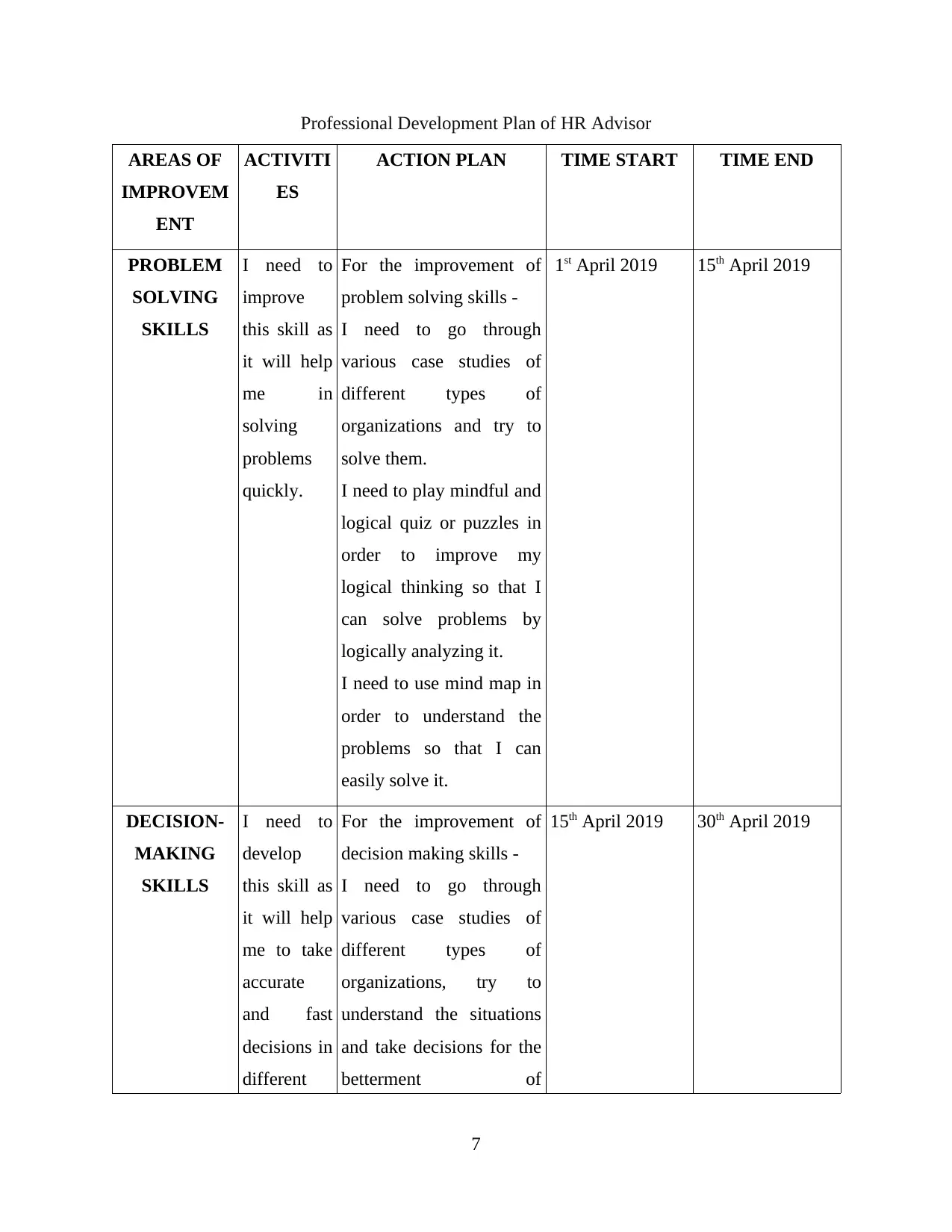
Professional Development Plan of HR Advisor
AREAS OF
IMPROVEM
ENT
ACTIVITI
ES
ACTION PLAN TIME START TIME END
PROBLEM
SOLVING
SKILLS
I need to
improve
this skill as
it will help
me in
solving
problems
quickly.
For the improvement of
problem solving skills -
I need to go through
various case studies of
different types of
organizations and try to
solve them.
I need to play mindful and
logical quiz or puzzles in
order to improve my
logical thinking so that I
can solve problems by
logically analyzing it.
I need to use mind map in
order to understand the
problems so that I can
easily solve it.
1st April 2019 15th April 2019
DECISION-
MAKING
SKILLS
I need to
develop
this skill as
it will help
me to take
accurate
and fast
decisions in
different
For the improvement of
decision making skills -
I need to go through
various case studies of
different types of
organizations, try to
understand the situations
and take decisions for the
betterment of
15th April 2019 30th April 2019
7
AREAS OF
IMPROVEM
ENT
ACTIVITI
ES
ACTION PLAN TIME START TIME END
PROBLEM
SOLVING
SKILLS
I need to
improve
this skill as
it will help
me in
solving
problems
quickly.
For the improvement of
problem solving skills -
I need to go through
various case studies of
different types of
organizations and try to
solve them.
I need to play mindful and
logical quiz or puzzles in
order to improve my
logical thinking so that I
can solve problems by
logically analyzing it.
I need to use mind map in
order to understand the
problems so that I can
easily solve it.
1st April 2019 15th April 2019
DECISION-
MAKING
SKILLS
I need to
develop
this skill as
it will help
me to take
accurate
and fast
decisions in
different
For the improvement of
decision making skills -
I need to go through
various case studies of
different types of
organizations, try to
understand the situations
and take decisions for the
betterment of
15th April 2019 30th April 2019
7
⊘ This is a preview!⊘
Do you want full access?
Subscribe today to unlock all pages.

Trusted by 1+ million students worldwide
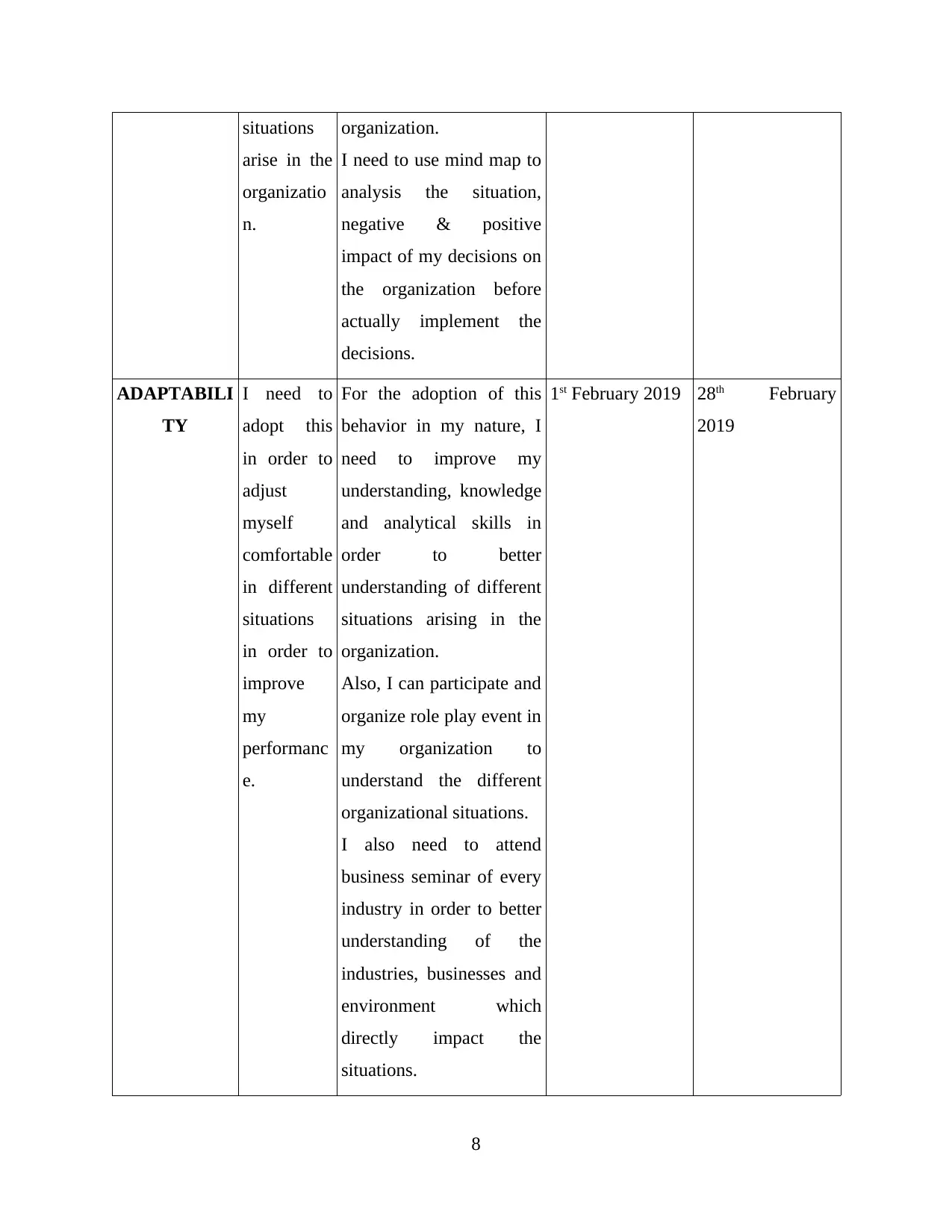
situations
arise in the
organizatio
n.
organization.
I need to use mind map to
analysis the situation,
negative & positive
impact of my decisions on
the organization before
actually implement the
decisions.
ADAPTABILI
TY
I need to
adopt this
in order to
adjust
myself
comfortable
in different
situations
in order to
improve
my
performanc
e.
For the adoption of this
behavior in my nature, I
need to improve my
understanding, knowledge
and analytical skills in
order to better
understanding of different
situations arising in the
organization.
Also, I can participate and
organize role play event in
my organization to
understand the different
organizational situations.
I also need to attend
business seminar of every
industry in order to better
understanding of the
industries, businesses and
environment which
directly impact the
situations.
1st February 2019 28th February
2019
8
arise in the
organizatio
n.
organization.
I need to use mind map to
analysis the situation,
negative & positive
impact of my decisions on
the organization before
actually implement the
decisions.
ADAPTABILI
TY
I need to
adopt this
in order to
adjust
myself
comfortable
in different
situations
in order to
improve
my
performanc
e.
For the adoption of this
behavior in my nature, I
need to improve my
understanding, knowledge
and analytical skills in
order to better
understanding of different
situations arising in the
organization.
Also, I can participate and
organize role play event in
my organization to
understand the different
organizational situations.
I also need to attend
business seminar of every
industry in order to better
understanding of the
industries, businesses and
environment which
directly impact the
situations.
1st February 2019 28th February
2019
8
Paraphrase This Document
Need a fresh take? Get an instant paraphrase of this document with our AI Paraphraser
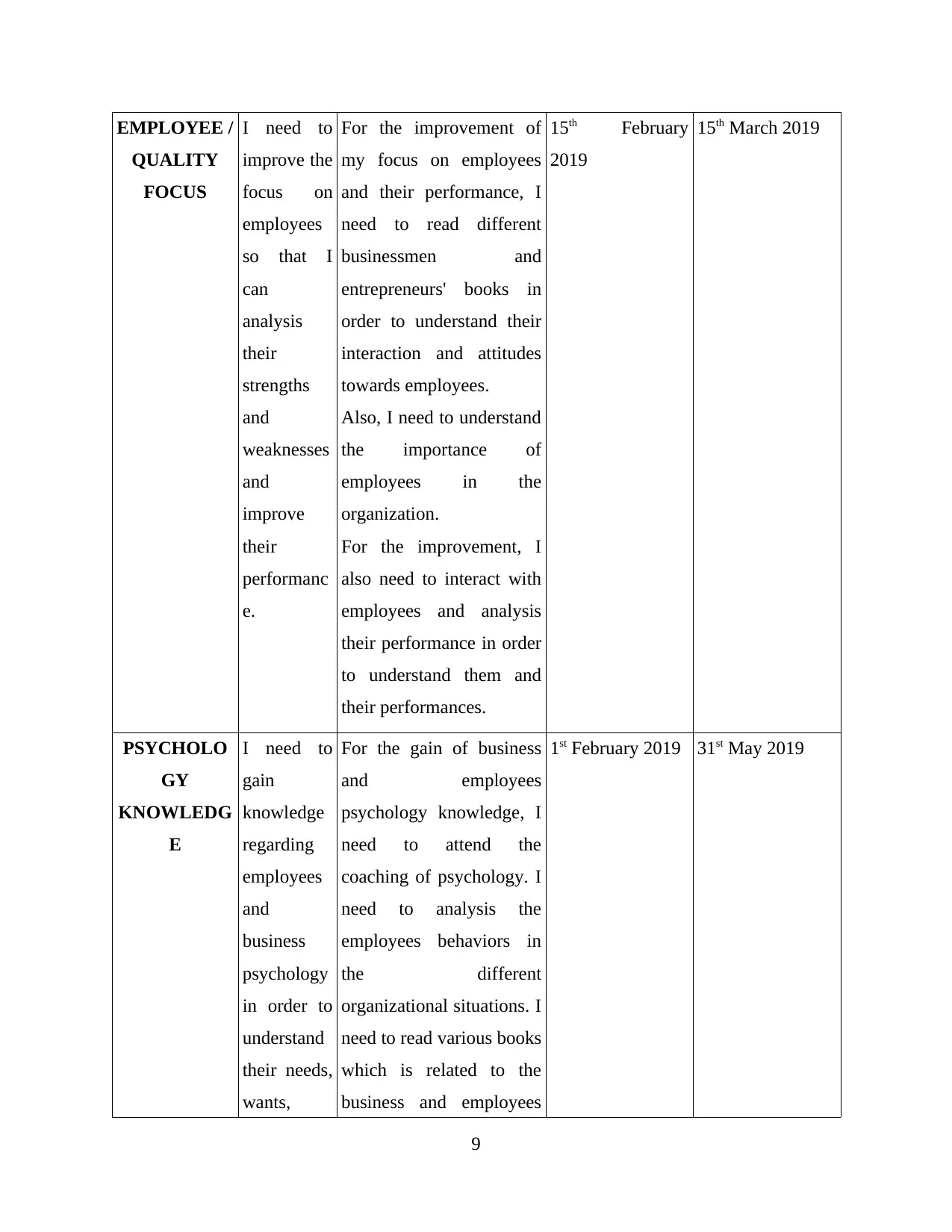
EMPLOYEE /
QUALITY
FOCUS
I need to
improve the
focus on
employees
so that I
can
analysis
their
strengths
and
weaknesses
and
improve
their
performanc
e.
For the improvement of
my focus on employees
and their performance, I
need to read different
businessmen and
entrepreneurs' books in
order to understand their
interaction and attitudes
towards employees.
Also, I need to understand
the importance of
employees in the
organization.
For the improvement, I
also need to interact with
employees and analysis
their performance in order
to understand them and
their performances.
15th February
2019
15th March 2019
PSYCHOLO
GY
KNOWLEDG
E
I need to
gain
knowledge
regarding
employees
and
business
psychology
in order to
understand
their needs,
wants,
For the gain of business
and employees
psychology knowledge, I
need to attend the
coaching of psychology. I
need to analysis the
employees behaviors in
the different
organizational situations. I
need to read various books
which is related to the
business and employees
1st February 2019 31st May 2019
9
QUALITY
FOCUS
I need to
improve the
focus on
employees
so that I
can
analysis
their
strengths
and
weaknesses
and
improve
their
performanc
e.
For the improvement of
my focus on employees
and their performance, I
need to read different
businessmen and
entrepreneurs' books in
order to understand their
interaction and attitudes
towards employees.
Also, I need to understand
the importance of
employees in the
organization.
For the improvement, I
also need to interact with
employees and analysis
their performance in order
to understand them and
their performances.
15th February
2019
15th March 2019
PSYCHOLO
GY
KNOWLEDG
E
I need to
gain
knowledge
regarding
employees
and
business
psychology
in order to
understand
their needs,
wants,
For the gain of business
and employees
psychology knowledge, I
need to attend the
coaching of psychology. I
need to analysis the
employees behaviors in
the different
organizational situations. I
need to read various books
which is related to the
business and employees
1st February 2019 31st May 2019
9
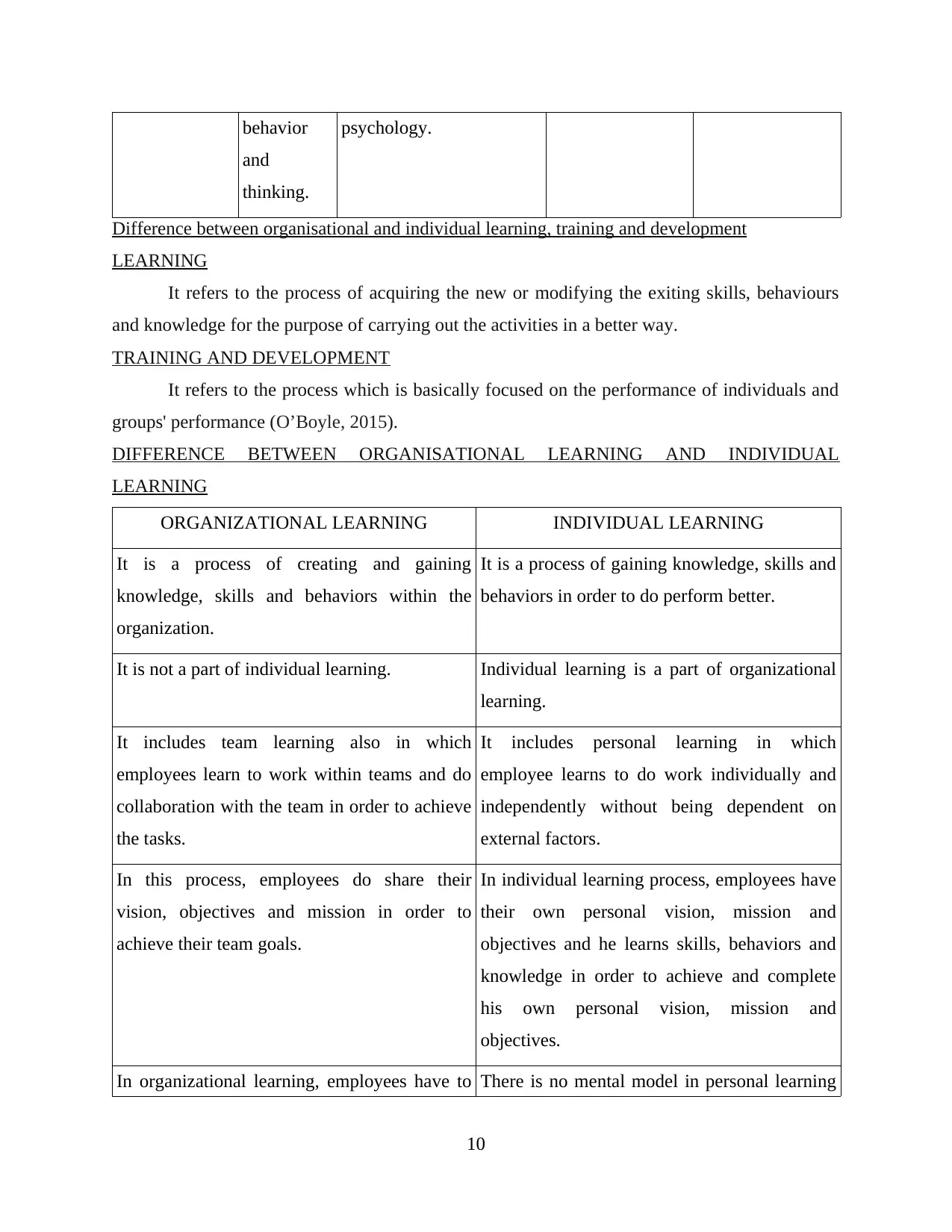
behavior
and
thinking.
psychology.
Difference between organisational and individual learning, training and development
LEARNING
It refers to the process of acquiring the new or modifying the exiting skills, behaviours
and knowledge for the purpose of carrying out the activities in a better way.
TRAINING AND DEVELOPMENT
It refers to the process which is basically focused on the performance of individuals and
groups' performance (O’Boyle, 2015).
DIFFERENCE BETWEEN ORGANISATIONAL LEARNING AND INDIVIDUAL
LEARNING
ORGANIZATIONAL LEARNING INDIVIDUAL LEARNING
It is a process of creating and gaining
knowledge, skills and behaviors within the
organization.
It is a process of gaining knowledge, skills and
behaviors in order to do perform better.
It is not a part of individual learning. Individual learning is a part of organizational
learning.
It includes team learning also in which
employees learn to work within teams and do
collaboration with the team in order to achieve
the tasks.
It includes personal learning in which
employee learns to do work individually and
independently without being dependent on
external factors.
In this process, employees do share their
vision, objectives and mission in order to
achieve their team goals.
In individual learning process, employees have
their own personal vision, mission and
objectives and he learns skills, behaviors and
knowledge in order to achieve and complete
his own personal vision, mission and
objectives.
In organizational learning, employees have to There is no mental model in personal learning
10
and
thinking.
psychology.
Difference between organisational and individual learning, training and development
LEARNING
It refers to the process of acquiring the new or modifying the exiting skills, behaviours
and knowledge for the purpose of carrying out the activities in a better way.
TRAINING AND DEVELOPMENT
It refers to the process which is basically focused on the performance of individuals and
groups' performance (O’Boyle, 2015).
DIFFERENCE BETWEEN ORGANISATIONAL LEARNING AND INDIVIDUAL
LEARNING
ORGANIZATIONAL LEARNING INDIVIDUAL LEARNING
It is a process of creating and gaining
knowledge, skills and behaviors within the
organization.
It is a process of gaining knowledge, skills and
behaviors in order to do perform better.
It is not a part of individual learning. Individual learning is a part of organizational
learning.
It includes team learning also in which
employees learn to work within teams and do
collaboration with the team in order to achieve
the tasks.
It includes personal learning in which
employee learns to do work individually and
independently without being dependent on
external factors.
In this process, employees do share their
vision, objectives and mission in order to
achieve their team goals.
In individual learning process, employees have
their own personal vision, mission and
objectives and he learns skills, behaviors and
knowledge in order to achieve and complete
his own personal vision, mission and
objectives.
In organizational learning, employees have to There is no mental model in personal learning
10
⊘ This is a preview!⊘
Do you want full access?
Subscribe today to unlock all pages.

Trusted by 1+ million students worldwide
1 out of 18
Related Documents
Your All-in-One AI-Powered Toolkit for Academic Success.
+13062052269
info@desklib.com
Available 24*7 on WhatsApp / Email
![[object Object]](/_next/static/media/star-bottom.7253800d.svg)
Unlock your academic potential
Copyright © 2020–2025 A2Z Services. All Rights Reserved. Developed and managed by ZUCOL.



